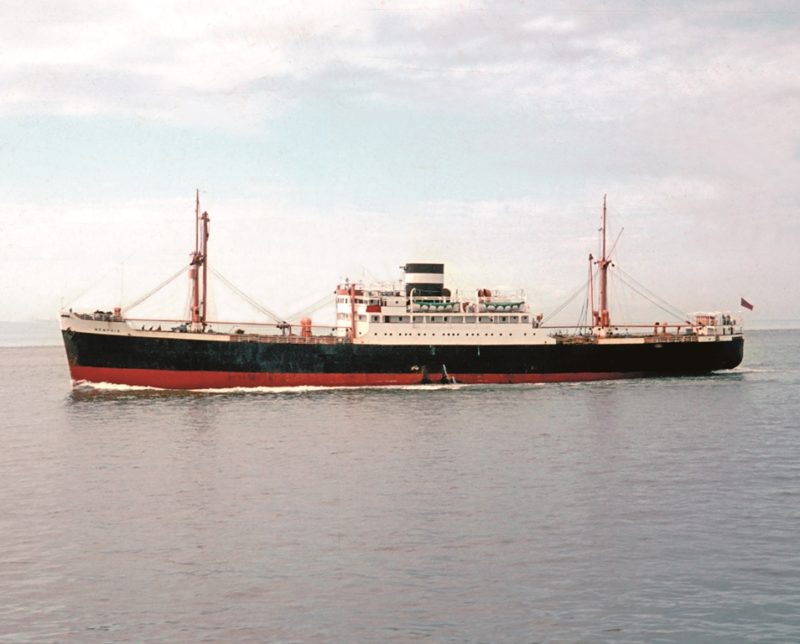
This is the story of two great companies that traded to the Bay of Biscay and Mediterranean, and had been founded by James Moss (1794–1849) in Liverpool, and John and Peter Hutchison in Glasgow. The Moss companies were taken over by the Royal Mail Steam Packet Co. Ltd. in 1916, and three years later Royal Mail used the Moss Steamship Co. Ltd. to buy J. & P. Hutchison Ltd. of Glasgow. The two companies continued to trade separately in the boom and slump conditions of 1920/21 until the collapse of the Royal Mail Group in 1932, with Lord Kylsant as Chairman, and formerly known as Sir Owen Cosby Philipps, serving a year in gaol for grossly overstating the profit potential of share issues. The two companies went into voluntary liquidation in early April 1934, and Moss Line then amalgamated with J. & P. Hutchison Ltd. and established a new company, Moss Hutchison Line, on 5th April 1934. At the end of 1935, the General Steam Navigation Co. Ltd. of London (owned by P. & O.) acquired Moss Hutchison Line, with GSNC (and P. & O.) having been advised by the accountants Deloitte, Plender, Griffiths & Company to go ahead with this transaction.
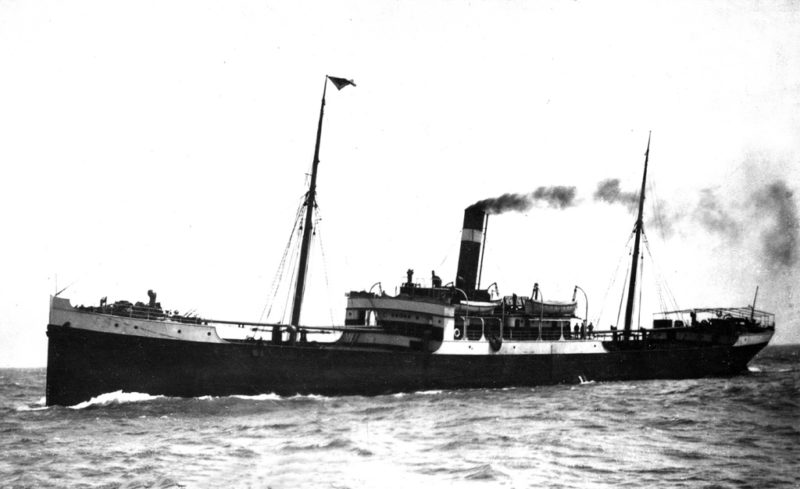
JAMES MOSS & COMPANY of LIVERPOOL
James Moss was a Liverpool ship’s chandler who began chartering sailing ships and trading to Baltic ports in 1815 and to Mediterranean ports a few years later, and he was joined in partnership by Thomas Hampson in the style of Moss & Hampson. This partnership was dissolved in 1833, and James Moss then partnered with his nephew, William Miles Moss, and Richard Spencer under the title of James Moss & Company. The Mediterranean trade was still conducted by sailing ships and schooners in 1849, and after the death of his uncle, William Miles Moss was convinced that the time was right to introduce steamers to the trade. He thus invited all those engaged in the trade to his house for dinner.
Ships were owned on the 64ths principle and he was willing to contract for a steamer costing £21,000 with Denny of Dumbarton and he invited his guests to take some 64ths along with him. However, they only responded to the extent of £12,000, and he then took the balance himself in the vessel, which was completed as Nile of 528 grt with paddles powered by a two cylinder compound steam engine and was sail assisted on three masts to give a speed of ten knots.
A sister named Orontes of 522 grt was launched on 20th March 1851 with William Miles Moss as the major shareholder and Frank Chapple as the other important shareholder. The young and ambitious Alfred Holt sailed in her in late 1851 on her maiden voyage to Egypt, and just after the end of the Crimean War he began a service with Moss to Bordeaux and Nantes and to Alexandria for cotton. He was later, of course, to found the important Blue Funnel Line to the Far East in 1865. Nile was sold in 1853 to the British and Irish Steam Packet Co. Ltd., and on 28th November 1854 sailed from Liverpool under Capt. Moppett for Penzance and London with five passengers and a crew of 25. She ran aground on rocks off Godrevy Light House near St. Ives on the night of 30th November and sank in deep water, with all crew and passengers lost. Orontes fared better and was sold to Ellerman & Papayanni in 1859 and then two years later to H. Withers of Liverpool to sail for many years afterwards.
John Bibby of Liverpool also began to introduce steamers in 1850 to the Mediterranean trade, and both he and James Moss were the major shareholders in their own steamers, and also when there was an overlap in ownership with other Liverpool shipowners such as Leyland, Lamport, Holt, Chapple, Viana and Jones. The Liverpool and Mediterranean Steam Ship Company (LMSSCO) was founded in 1850 and sailed to French, Portuguese, Spanish and Italian ports, with general cargo e.g. beer exported to Malta for Ind, Coope & Company, returning with cotton from Egyptian and North African ports.
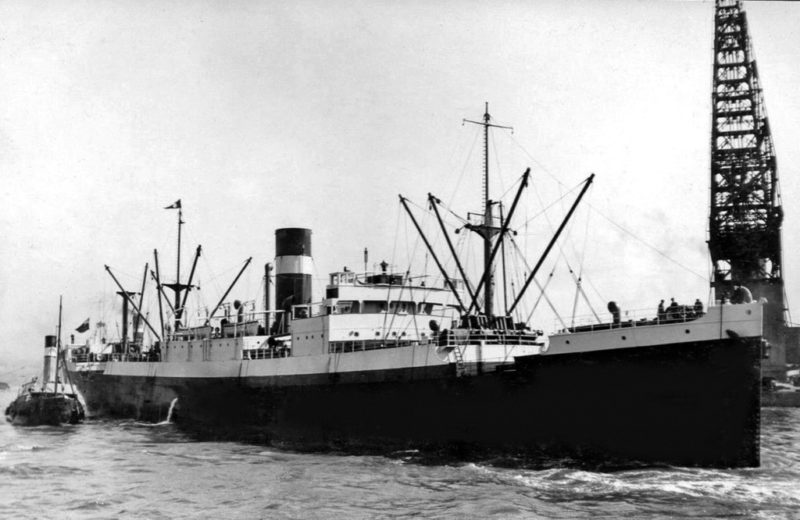
The sisters Arno and Tiber of 660 grt were launched on 5th November 1850 and 29th September 1851 respectively at the John Reid & Company yard at Port Glasgow for LMSSCO on dimensions of length 190.0 feet and moulded beam of 16.6 feet as three masted iron screw steamers. They were subsequently lengthened and widened at Belfast by Harland, with Arno sold to the General Steam Navigation Co. Ltd. in 1861, and to the Leith General Steam Navigation Company in 1864. Arno collided on 14th January 1866 with the North Shields brig Medina off the Yorkshire coast while on a voyage from Granton to London, with her assailant carrying grain from Azoz to Leith. Six crew of Medina were taken onboard Arno before the brig quickly sank with the loss of four lives. Arno was leaking badly and was run aground, with 48 passengers and crew rescued by another ship, and her Master, 18 crew and two women were rescued by a steam collier. Arno sank later that day while in tow from Huntcliffoot to the Tyne with the loss of a fireman who had been left onboard. The sister Tiber, on the other hand, had a much longer career until wrecked on the Cuban coast in 1894 for other owners.
LMSSCO owned many more steamers trading to the Mediterranean including Danube of 1,386 grt launched on 16th August 1856 at the Smith & Rodger yard at Govan, with John Bibby and Frederick Leyland taking 34 shares in her, James Moss taking seven shares, and other Liverpool shipowners taking the remaining 23 shares. Isis of 1,400 grt was completed in 1865 for LMSSCO, with Moss taking 24 shares, Bibby five shares, Leyland three shares, Lamport four shares, Holt four shares, and other Liverpool shipowners taking the remaining 24 shares. However, it was the dominant Liverpool shipowners of James Jenkinson Bibby and William Miles Moss in a network of Moss-Bibby steamers who owned half of all the steamers trading to the Mediterranean by 1870. William Miles Moss died just over a year later, thus ending the co-operation between Moss and Bibby.
The Levant Screw Steam Shipping Company had also been founded in 1854 as a jointly owned company by William Miles Moss and John Bibby to trade to Eastern Mediterranean ports, Constantinople and Beirut. The Moss fleet of steamers and the steamers Albanian and Corinthian of Bibby were used until the goodwill and trade of the company was acquired in 1857 by Bibby. The funnel colours of this company were pink with a black top, and these famous colours were then adopted for the whole of the Bibby Line fleet. The Moss steamers were the first to load homewards from Egypt with cotton, and subsequently developed this trade from the port of Alexandria.
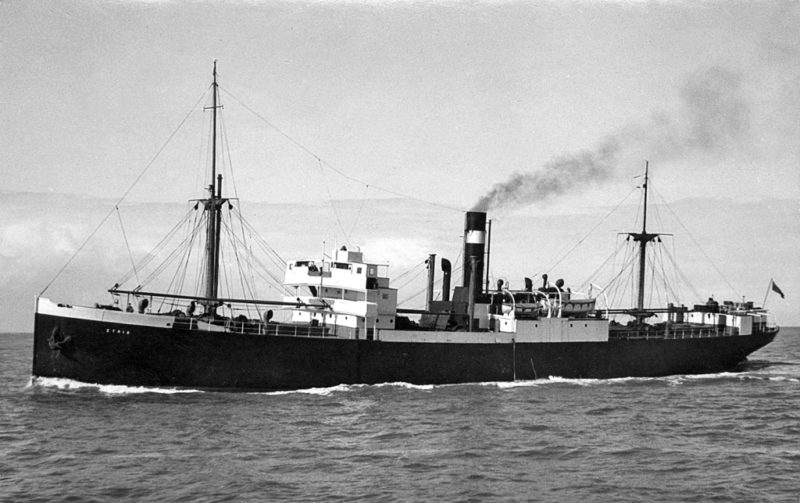
William Miles Moss had contracted with the Denny & Rankin shipyard in Dumbarton to buy a steamer that had been built ‘on spec’, and it was launched on 17th March 1858 on dimensions of length 175.8 feet, moulded beam of 23.9 feet, and moulded depth of 13.6 feet. She was named Nemesis, an unfortunate name as she met her own nemesis on the Pointe du Raz on the infamous razor rocks of the Raz de Sein near Concarneau on 13th September 1860 while on a voyage from Liverpool to Bordeaux with general cargo and seven passengers. She floated off the rocks and sank suddenly in deep water, with the crew and passengers rescued from the ship’s boats. Capt. Morrish was reprimanded by the Board of Trade for her loss, but his certificate was not withdrawn.
William Miles Moss then contracted for a series of steamers with the Hull yard owned by Charles and William Earle. Atlantic of 1,320 grt was completed in 1857, followed by Cecilie of 563 grt and Lotus of 589 grt in 1863, Olinda of 632 grt in 1865, and the much bigger iron screw steamers Isis of 1,806 grt in 1862, Thebes of 2,068 grt in 1865, Magdala of 2,134 grt in 1868, and culminating with the last and largest ship built by the yard in 1870, Canopus of 2,802 grt. These three masted iron screw steamers were sail assisted when sailing conditions were right on their voyages to the Mediterranean. Charles Earle died in 1870, and William Earle a year later in 1871 at the young age of 49 years, leaving joint assets totalling £250,000, and with the yard then sold to a consortium of London, Manchester and Sheffield shareholders.
James Moss & Company owned thirteen steamers in 1873 when the Moss Steamship Co. Ltd. was formed with James Moss & Company as managers, shortly after the passing of the Companies Limited Liability Act. Three masted sail assisted steamers built by other shipbuilders were also in the fleet, including Neera of 2,167 grt of 1868 and purchased a year later, followed by Pera of 1,824 grt in 1876, both by Andrew Leslie of Hebburn, and Osiris of 1,879 grt in 1875 and Osmanli of 2,283 grt in 1880 by Charles Mitchell of Newcastle. Osiris was named after the Egyptian god of death and rebirth at her launch in June 1875.
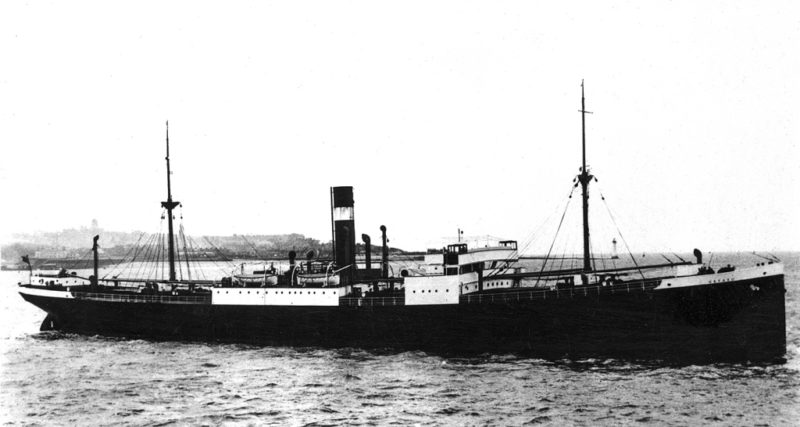
The launch of Osmanli at Newcastle was witnessed on 24th May 1880 by Thomas Moss, senior partner of James Moss & Company and Mr. Esplen, Superintendent Engineer, with the vessel launched by Mrs. Charles Mitchell. The design of the vessel featured a topgallant fo’c’stle, long bridge deck, a small rounded poop, and her two iron decks were covered with wood. The two cylinder compound steam engine was ‘midships, and the ship had dimensions of length 330.5 feet, moulded beam of 35.0 feet, and moulded depth of 23.6 feet. Osiris and Osmanli were both sold to the Glasgow firm of the Mossgiel Steamship Co. Ltd. (J. Bruce & Company as managers) between 1898 and 1900.
Neera was wrecked in the Red Sea on 21st April 1884 while on a Moss voyage from Liverpool to Suakin in Sudan with coal and general cargo, but her Tyne built fleetmate of Pera gave 22 years of service to Moss and was broken up at Preston in January 1898. Steel replaced iron for the construction of hulls in 1883, and triple expansion steam reciprocating engines gave faster service speeds by the late 1880s. Tabor and Anubis, both of 2,406 grt were completed in early 1890 by the Aitken & Mansel yard in Glasgow as three island ships with a fo’c’stle of length 38 feet, a bridge deck of 114 feet, and a poop of length 26 feet, and powered by triple expansion steam reciprocating engines. Rameses and Menes, both of 2,495 grt, were completed by the famous Clydeside yard of Robert Napier & Sons between 1893 and 1895 on dimensions of length 320.5 feet, moulded beam of 38.2 feet, and moulded depth of 23.1 feet, with two decks held together by deep frames and six bulkheads. The triple expansions steam reciprocating engines were constructed by Rollo & Son of Liverpool, and for ballast voyages they carried 565 tons of water ballast.
At the turn of the century in 1900, a dozen steel hulled three island steamers were owned, including Amasis of 2,336 grt completed in February 1895 by Andrew Leslie of Hebburn, Nitocris of 2,669 grt completed in November 1896 by Sir Raylton Dixon at Middlesbrough with a steel deck and a spar deck, and a triple expansion steam reciprocating built on the Tyne by the North Eastern Marine Engineering Co. Ltd. Philae of 2,769 grt was given a similar steam engine from the same manufacturer on the Tyne when completed by the North Sands yard of John Blumer in July 1898 at Sunderland. All of these big three island steamers had overall lengths of up to 345.0 feet, moulded beams of up to 46.0 feet, and moulded depths of up to 25.0 feet, and were followed by Moeris of 3,409 grt and Seti of 3,090 grt in 1902, Busiris, Menepthah and Khephren of 2,800 grt in 1904/05 built with one steel deck and a spar deck. The North Sands yard of John Blumer at Sunderland built Karnak of 3,171 grt in 1906 and her near sister of Esneh of 3,247 grt in 1908 on dimensions of overall length of 336.0 feet, moulded beam of 47.0 feet, and moulded depth of 24.0 feet with long bridge decks of 102 feet, and triple expansion steam reciprocating engines supplied by John Dickinson & Sons of Sunderland.
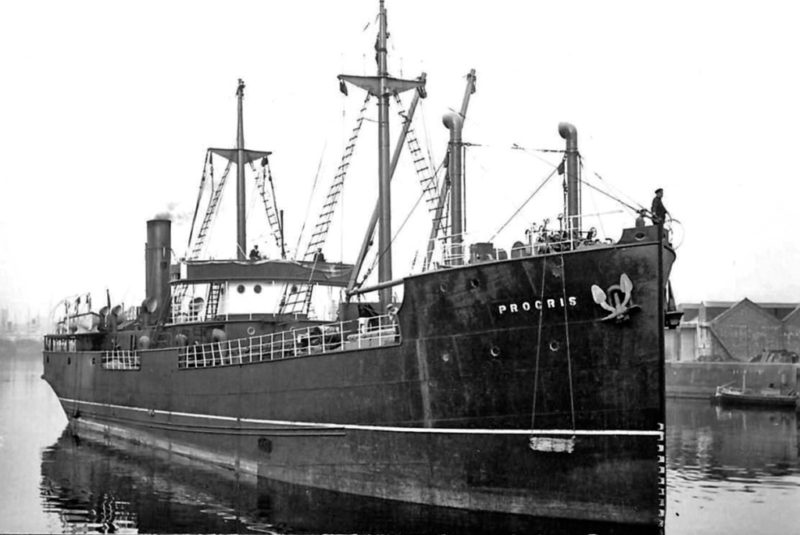
A dozen steamers were owned by the Moss Steamship Co. Ltd. on the outbreak of war in August 1914, including Sebek of 4,691 grt launched on 5th July 1909 as Harpeake for J. & C. Harrison Ltd. of London and purchased by Moss in 1913, Tanis of 3,657 grt completed by the Irvine Shipbuilding and Drydock Co. Ltd. at West Hartlepool in October 1913, and Hathor of 3,823 grt completed in April 1914 by the John Blumer yard at Sunderland on dimensions of length 350.0 feet, moulded beam of 38.2 feet, and moulded depth of 26.7 feet with two steel decks, a triple expansion steam reciprocating engine by the North Eastern Marine Engineering Co. Ltd., and double bottom spaces and forepeak and aft peak for 1,415 tons of water ballast.
Unfortunately, all of this very fine fleet of Mediterranean traders were lost during the war, with only two survivors, Karnak of 1906 and Siptah of 1906, and including the loss of two new steamers completed during the war. The big steamers were routed from Liverpool around the north and west coasts of Ireland in convoys from 1917 to Gibraltar and the Mediterranean ports of Spain, Italy and Alexandria in Egypt. Seti of 1902 became a depot ship for the Admiralty in 1914, with Sebek torpedoed and sunk on 21st April 1917 by U70 when 145 miles off Tory Island, north west Ireland while on a voyage from Liverpool to Alexandria. Tanis had been captured and shelled by U33 on 27th November 1915 when three miles from Zembra Island off Tunisia while on a voyage from Liverpool to Alexandria. The smaller sisters Vendee and Vosges of 1,295 grt completed in 1911 by the Sir Raylton Dixon yard at Middlesbrough for the Bordeaux trade were also sunk. Vendee was mined and sunk at the mouth of the Gironde on 8th July 1917, while Vosges had been shelled and sunk by U28 38 miles west of Trevose Head on 27th March 1915 on her voyage from Liverpool to Bordeaux.
The rebuilding of the Moss fleet, owned since 1916 by the Royal Mail Steam Packet Co. Ltd. when it paid £1.245 million for the Moss companies, was completed by the purchase of standard ships and other ships to a fleet of a dozen ships. The Egyptian traders Amarna and Assiout of 4,215 grt were turbine powered types, while Limoges was the smaller War Leven of 1,434 grt launched on 17th January 1919 as War Leven at the Caledon yard in Dundee but completed as Limoges with a service speed of twelve knots from a triple expansion steam reciprocating engine.
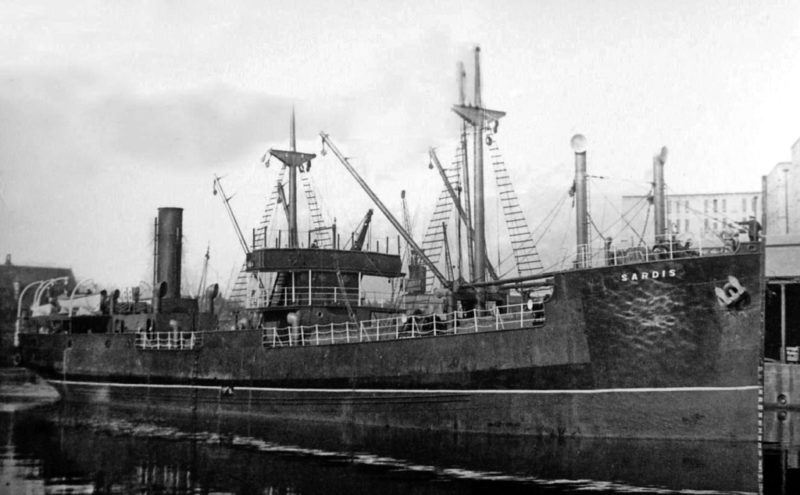
The engines ‘midships Landes and Lormont of 1,276 grt were completed in 1920 by the Hawthorns & Co. Ltd. yard at Leith, and joined the survivors Karnak and Siptah, and the purchased large vessels Amasis (ex Glenrazan) completed in September 1913 at Antwerp and Sitra (ex Dalrazan) completed at Stockton in September 1910, and Luque completed in 1904. The engines ‘midships standard sisters Esneh and Etrib of 1,943 grt were completed in 1919 by the Swan, Hunter & Wigham Richardson Ltd. yard at Sunderland as Western Coast and British Coast for Coast Lines, and purchased and renamed in 1922/23. The big steamer Hatasu of 3,198 grt was completed by the John Blumer yard at North Sands in Sunderland in 1921.
The Moss vessels loaded at the Huskisson Dock in Liverpool, Number 2 Branch, and the company agents during the inter-war years at ports of call were as follows:-
Alexandria R. J. Moss & Co.
Algiers E. Delacroix
Bordeaux James Moss Soc. Anon.
Constantinople J. W. Whittall & Co.
Gibraltar Smith, Imossi & Co.
Liverpool James Moss & Co.
Malta Thomas C. Smith & Co.
Smyrna C. Whittall & Co.
Syra Frydda & Angelinides
The Moss fleet was augmented during the 1920s decade by three steamers and two motorships. Kantara of 3,237 grt was launched as Lancier for Lloyd Royal Belge and completed for Moss in 1925 by the Barclay, Curle yard at Glasgow, and the sisters Kana and Kavak of 2,743 grt were built in 1929 by the Archibald MacMillan yard at Dumbarton, as the three steamers, while the motorships were the sisters Kheti in 1927 and Kufra in 1929 of 2,750 grt by the Harland & Wolff Ltd. yards on the Clyde. They were powered by B & W single acting oil engines with electric auxiliaries to give service speeds of eleven knots. These ships gave a Mediterranean trading fleet of fourteen vessels just before the Royal Mail Group crashed into financial ruins in 1932.
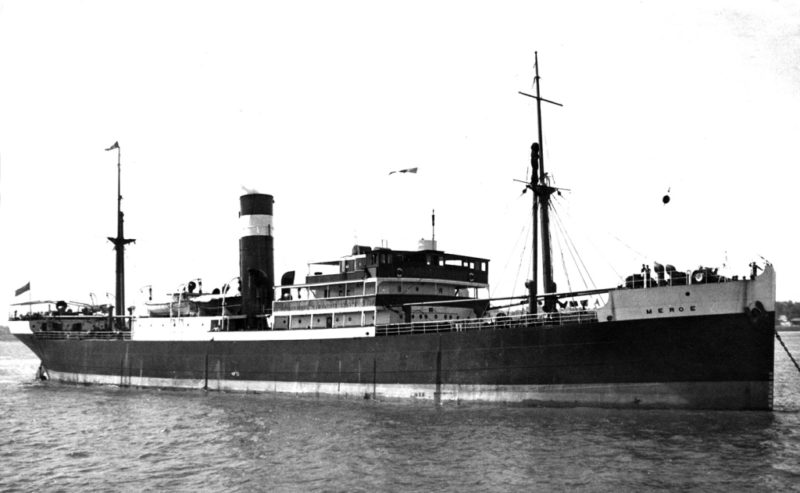
J & P. HUTCHISON of GLASGOW
John Hutchison founded the French and Peninsula Steam Packet Company in 1859 in partnership with ship’s agent Thomas Brown, with one of their first steamers being launched as Athanasian of 296 grt on 9th February 1860 by the James R. Napier yard at Govan at a cost of £4,500. She had dimensions of length 145.5 feet, moulded beam of 25.0 feet, and moulded depth of 14.7 feet and was powered by a two cylinder compound steam engine. She was lengthened to 182.6 feet in 1861 (409 grt) and re-engined in 1864, but they sold her to a foreign buyer in February 1868 and repurchased her six months later and renamed her Neptune. Peter Hutchison joined the partnership in 1862, which was restyled as J. & P. Hutchison in 1868.

J & P. Hutchison vessels had black hulls and black funnels, but those ships that entered French ports hoisted on their mainmasts the French tricolor of blue, white and red vertical stripes with the addition of a green Scottish thistle on the white part of the flag. The flag was granted by France after the Franco-Prussian War of 1870/71 as a mark of appreciation because Hutchison ships had carried medical supplies free of charge for France. The steamer Neptune flew this flag when entering French ports, while other ships such as William Connel of 459 grt completed at Renfrew in June 1862, and Niobe also flew this unique flag. Niobe of 505 grt was completed in 1863 by the A. J. Inglis yard at Glasgow as Laurel for Laird Line Ltd. as a quarterdeck two masted steamer on dimensions of length 212.8 feet, moulded beam of 25.2 feet and moulded depth of 12.2 feet, and was purchased by J. & P. Hutchison on 2nd December 1881 and renamed as Niobe in 1888. Niobe was sunk by collision while trading to Bordeaux on 28th November 1905.
A fleet of eight small steamers was being traded in 1876, comprising Clara 291/1864, Comorin 574/1863, Mauritius 585/1865, Mercury 418/1876, Minerva 687/1876, Neptune 409/1860, Thetis 338/1864 and William Connel 459/1862. Thetis had been built by Irvine, Currie & Company at West Hartlepool for the West Hartlepool Steam Navigation Co. Ltd. as Island Queen, and was purchased in 1873 and was wrecked on 12th January 1882 at Galway while on a voyage from Liverpool to Spain. Mercury was launched on 21st October 1876 by Henry Murray & Company at Port Glasgow and completed before the end of the year on dimensions of length 182.0 feet, moulded beam of 24.0 feet, and moulded depth of 13.3 feet, but was lengthened by 18.6 feet in 1878, and unfortunately sank on 3rd November 1880 after her cargo had shifted 24 miles off Ushant while on a voyage from Glasgow via Youghal to Bordeaux with oats.
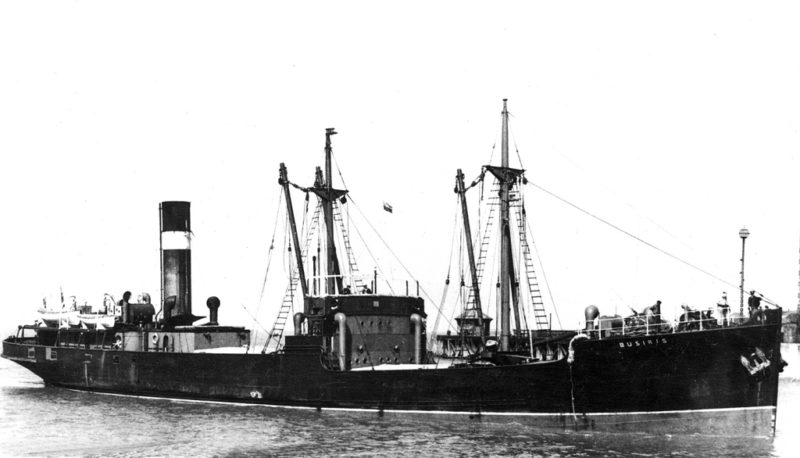
Clara had been launched on 12th July 1864 by the Alexander Stephen & Sons Ltd. yard at Kelvinhaugh for Benjamin Simons of Glasgow on dimensions of length 165.4 feet, moulded beam of 20.9 feet, and moulded depth of 12.1 feet. She was reboilered and re-engined after her original two cylinder compound steam engine gave problems, and was purchased by J. & P. Hutchison in 1873 to give 31 years of service until sold to an Alexandria owner in Egypt and renamed Marigo. Comorin had been launched on 15th August 1863 by William Simons & Co. Ltd. at Renfrew on dimensions of length 176.5 feet, moulded beam of 25.2 feet, and moulded depth of 14.1 feet for the British India Steam Navigation Co. Ltd., but had been abandoned by B.I. then salved and towed back to Glasgow, and was purchased in 1871 by J. & P. Hutchison. She was wrecked off Brittany in 1905 after a long career of 34 years with Hutchison. Minerva had been launched on 3rd July 1867 by the Alexander Stephen & Sons Ltd. yard at Kelvinhaugh as Hannah Simons for Benjamin Simons of Glasgow but was sold to a foreign buyer in 1871 and renamed Minerva, and then purchased by J. & P. Hutchison in 1875. She gave 22 years of service to Hutchison before being abandoned at sea in March 1897.
John Hutchison died in 1883, having brought his son Thomas into the partnership, with Peter Hutchison living on until his death in 1899. The J. & P. Hutchison fleet at the turn of the century comprised fourteen steamers including Princess Alexandra of 649 grt and launched on 4th July 1863 by Blackwood & Gordon at Port Glasgow for the London & Limerick Steam Ship Company. She passed to William Sloan in March 1870 without change of name, and then to J. & P. Hutchison in February 1889. She was sold after 21 years of service to John Stewart & Company of Glasgow and then in 1914 to Nefi Bey of Constantinople, and was sunk by gunfire on 16th June 1915 by Russian destroyers in the Black Sea between Zongouldak and the Bosphorus. The new steamer Juno of 607 grt was completed in 1894 by the Samuel McKnight yard at Ayr for J. & P. Hutchison, but after seven years of service was sold to the Royal Mail Steam Packet Company and renamed Arno for inter island Caribbean trading. She was used by the Admiralty for two years from February 1915 to June 1917 as an ammunition carrier, but after sale to a Canadian owner in 1922 she was wrecked off St. Renews Rock near Cape Race while on her delivery voyage from Liverpool to Quebec in ballast on 10th May 1922 with her crew fortunately rescued.
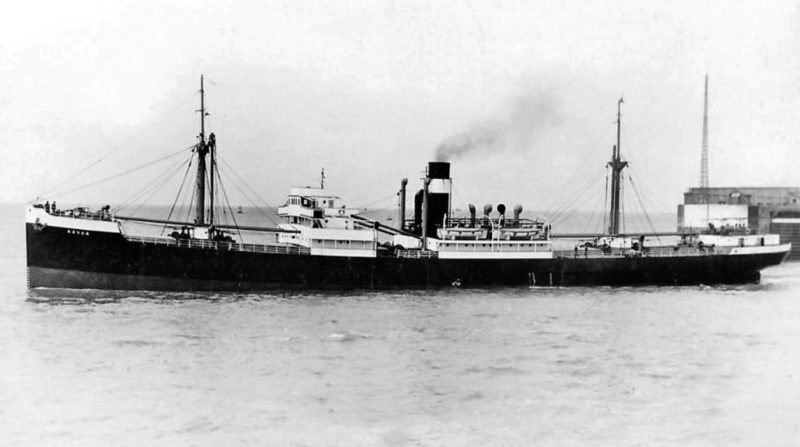
The larger steamers Apollo of 2,076 grt and Alverton of 1,397 grt had overall lengths of 270.3 feet and 240.0 feet respectively. Apollo had been launched on 2nd February 1882 by the Sir Raylton Dixon yard at Middlesbrough as Joseph Arbib for E. & E. Arbib and was purchased by J. & P. Hutchison in 1899 and renamed Apollo, but unfortunately sank in the Bay of Biscay on 14th November 1912 while on a voyage from Cagliari to Coueron with a cargo of lead. Alverton was launched on 10th April 1880 at the Edward Withy yard at West Hartlepool for Middleton & Company of West Hartlepool and was purchased by J. & P. Hutchison in 1896. She gave eleven years of service before her sale in 1907 to C. Rossi et Cie of Marseille and she was renamed Bonneveine and broken up two years later at Marseille.
A larger fleet of eighteen steamers was being traded by J. & P. Hutchison in 1911 to French and Peninsula ports from 31 Hope Street in Glasgow, their addresses of branch offices being as follows:-
Liverpool 24 Chapel Street
Manchester 196 Deansgate
Galway New Dock
Nantes 79 Quai de la Fosse
Rouen 4/5 Quai Cavalier de la Salle
Bordeaux Quai Bacalan
Oporto Cais da Estiva
Cadiz Muelle Ciudad
The largest steamers in the J. & P. Hutchison fleet in 1911 were the former Walter Runciman of Newcastle ship Dartmoor of 2,870 grt, completed in 1892 by the John Readhead yard at South Shields and purchased in 1905, Amphion of 2,931 grt completed in February 1911 by the Campbeltown Shipbuilding Company, and the quarter decker Fastnet of 2,227 grt completed back in May 1887 by the Pearse yard at Stockton. Unfortunately, most of this large fleet became war losses during the Great War, with only eight survivors in Arethusa of 670 dwt built in 1906 by the Ailsa Shipbuilding Co. Ltd. at Troon, Atalanta of 570 dwt built in 1905 by J. Shearer & Sons at Glasgow, Eastcheap of 960 dwt built in 1900 and purchased in 1915 and renamed Anubis in 1924, engines aft Endymion of 1,230 dwt built in 1909 by J. Fullerton & Company of Paisley, Hilda of 1,610 dwt built in 1901 by the Blyth Shipbuilding Co. Ltd., Paris of 750 dwt built in 1899 by the Irvine Shipbuilding & Engineering Co. Ltd. at Irvine, and Thetis of 710 dwt completed as Countess by Mackie & Thomson of Glasgow in 1896. The small coaster Floris of 424 grt had been purchased on 12th May 1917 as Braeneil from George Elsmie & Sons of Aberdeen, but was wrecked on 27th October 1924 on Trupailes Rock on the Ile d’Yeu while on a voyage from Swansea to Nantes and Bordeaux with tinplate and general cargo.
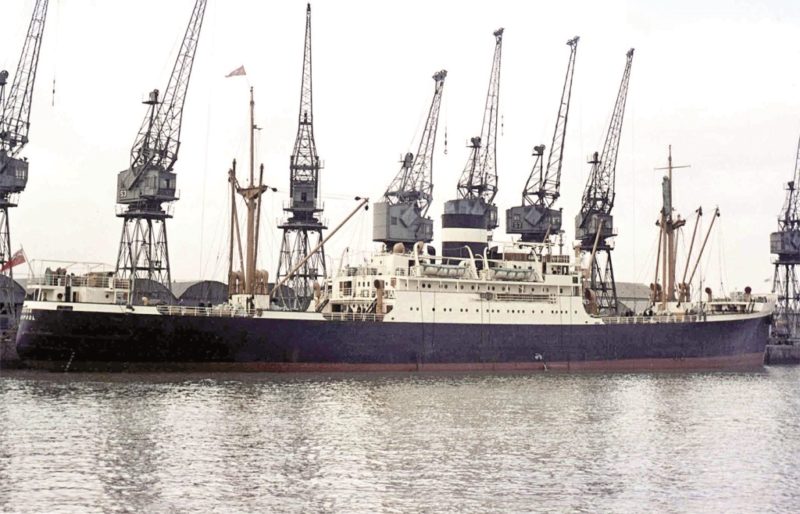
J. & P. Hutchison came within the ownership of the Royal Mail Steam Packet Co. Ltd. in 1919, and the fleet soon recovered to a dozen ships trading to France and the Iberian peninsula at that time, including the new sister engines aft steamers Philotis and Smerdis of 1,250 dwt from the Ardrossan Dry Dock & Shipbuilding Co. Ltd. in 1917/18 and powered by triple expansion steam reciprocating engines by Beardmore on the Clyde. Smerdis was renamed Memphis after she sank in the Mersey on 16th December 1922 at the end of a voyage from Bordeaux, with her name changed after expensive refloating and repairs. Philotis was sold to the British & Continental Steamship Co. Ltd. on 7th October 1935 and renamed Nyroca. The engines aft Smerdis (2) of 815 grt was purchased in December 1926, having been built as Marion Merrett for Merrett Brothers of Cardiff at Montrose in 1920. Ardenza of 933 grt was built for T. C. Steven & Company of Leith in 1920 by the local Hawthorns yard, and was purchased by Hutchison in 1924 without change of name, she had two holds forward of the navigating bridge and one hold aft. The engines aft steamer Chloris of 1,197 grt was originally built as Eider for Bugsier at Rendsburg in Germany by Nobiskrug Werft in 1921, and was purchased and renamed in 1923.
New vessels for J. & P. Hutchison began to arrive with the launch on 26th September 1924 of the engines aft Procris of 1,320 grt at the A. & J. Inglis yard on the Clyde, followed by her sister Fendris in 1925 from the same yard. The machinery aft Sardis of 970 grt was launched on 14th February 1928 at Ardrossan, and the similar Busiris of 943 grt followed from the Ailsa yard at nearby Troon. They had similar hull dimensions, with Sardis having two extra derricks forward to serve number 1 hold and which also served as ventilators. They gave long service of 22 years and 20 years respectively to the J. & P. Hutchison and Moss Hutchison Line fleets.
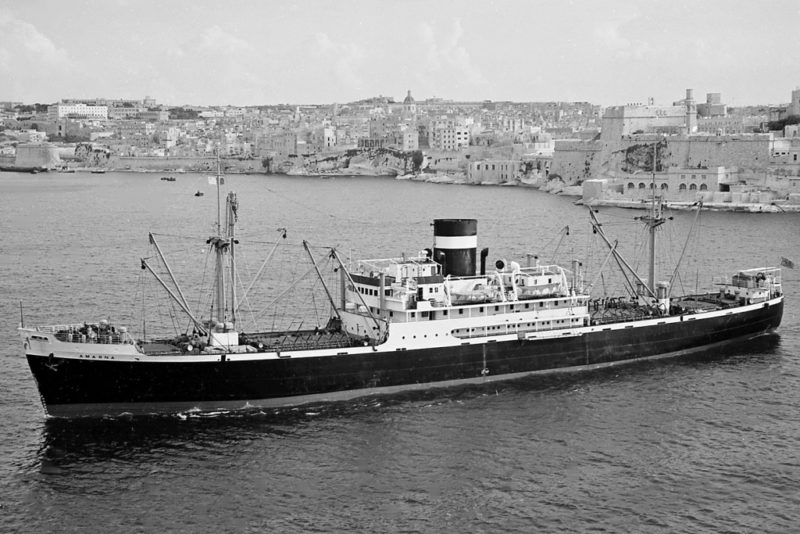
MOSS HUTCHISON LINE
Moss Hutchison Line was registered on 6th April 1934 on the amalgamation of James Moss & Company with J. & P. Hutchison, following the creation of Royal Mail Lines Ltd. in 1932 after the financial collapse of the Royal Mail Steam Packet Co. Ltd. The combined Continental and Mediterranean fleet of the two companies numbered twenty two vessels. The acquisition by General Steam Navigation Co. Ltd. of London (owned by P. & O.) of the Moss Hutchison Line for £388,859 followed six months later on 17th October 1934.
General Steam Navigation Co. Ltd. had vastly increased the scope of its trading by this purchase. Moss Line trade was from Liverpool and Glasgow to Bordeaux, the Eastern Mediterranean including Alexandria, the Black Sea, the Red Sea and Sudanese ports, and occasionally down to Mauritius for sugar. The Hutchison trade was from Glasgow, Dublin and West Coast U.K. ports as well as Hamburg, Bremen, and Rouen to Bordeaux, Portugal and Spain returning with wine and brandy. Moss Hutchison Line retained its own offices and management in co-operation with the services of General Steam Navigation Co. Ltd. after the take-over. The black funnel with a central white band of Moss Line was adopted for the combined fleet, and the white letters ‘M H’ were added to the red houseflag on either side of a white Maltese cross.
General Steam Navigation Co. Ltd. continued the rationalisation of its Mediterranean fleets, and then transferred three of its steamers to Moss Hutchison Line during 1937/39, with their Woodcock of 1927 renamed Lormont, the engines aft Corncrake of 1910 renamed Chloris, and Grebe of 1926 renamed Philotis. Two vessels were purchased from the fleet of the United Africa Co. Ltd. of Unilever Brothrs in Nigerian 4,900/25 renamed as Kyrenia but sold in 1937 to Bristol City Line of Charles Hill & Sons and renamed Toronto City, and Lafian 3,800/28 renamed Meroe. Toronto City was torpedoed and sunk on 1st July 1941 by U108 while in service as a Meteorological ship for the Admiralty. The Moss Hutchison fleet at the outbreak of World War II on 3rd September 1939 numbered ten vessels.
Moss Hutchison Line lost four ships during World War II to enemy action, with Kavak lost in the early hours of 2nd December 1940 in convoy HX90 from Halifax (NS). U101 sank her 340 miles west of Bloody Foreland with the loss of Capt. Napier and 24 of her crew. Kavak had been on a voyage from Demerara to Halifax (NS) and Newport with sugar, bauxite and pitch. Kantara, after dispersing in mid Atlantic from a convoy, encountered the raiding battlecruisers Scharnhorst and Gneisenau on 22nd February 1941. The salvos from Gneisenau wreaked havoc in her Master’s cabin, but radio messages were still transmitted from the radio room next door, although the signals were jammed by the battlecruiser. Capt. H. W. Weston had ordered the ship’s small calibre gun to reply to the salvos. After the sinking, all of the crew were rescued by the battlecruiser and transferred to a supply ship. The Master and three other crew members were commended by King George VI in 1946 for bravery in the face of huge odds.
Hatasu was torpedoed by U431 when 600 miles east of Cape Race on 2nd October 1941, the survivors drifted helplessly for two weeks in open boats through gales, high seas and low temperatures. When picked up by the escorts of an eastbound convoy, only a few were left alive suffering from severe exposure, but forty of her crew had died. Etrib was the last of the company fleet to be lost when torpedoed by U552 in mid June 1942 in the 23 ship convoy HG84 of Mediterranean traders that had sailed from Gibraltar on 9th June. Enemy agents had reported the sailing of the convoy and Focke-Wulf Condor aircraft had directed U boats to the position of the convoy. This convoy also lost two Mediterranean traders from Ellerman and one from the fleet of MacAndrews. Two old standard American ships of 7,500 dwt built in 1919 were managed for the Ministry of War Transport, with Bangu renamed Empire Antelope and torpedoed and sunk by U402 on 2nd November 1942 west of Labrador in position 52 26 North, 45 22 West while in convoy SC 107 to the U. K., while Berury was torpedoed and sunk on 11th September 1941 by U207 in convoy SC42 to the east of Cape Farwell while on a voyage from Quonset Point (Rhode Island) to Sydney (NS) and Belfast with the loss of one crew member. The motor vessel Sally Maersk 3,300/23 was managed for Maersk Line, as well as the French steamer Paul Emile Javary 2,600/26 for French owners, and the ‘Hansa’ type Imkenturm in 1945 when renamed Empire Gantry as a British prize ship.
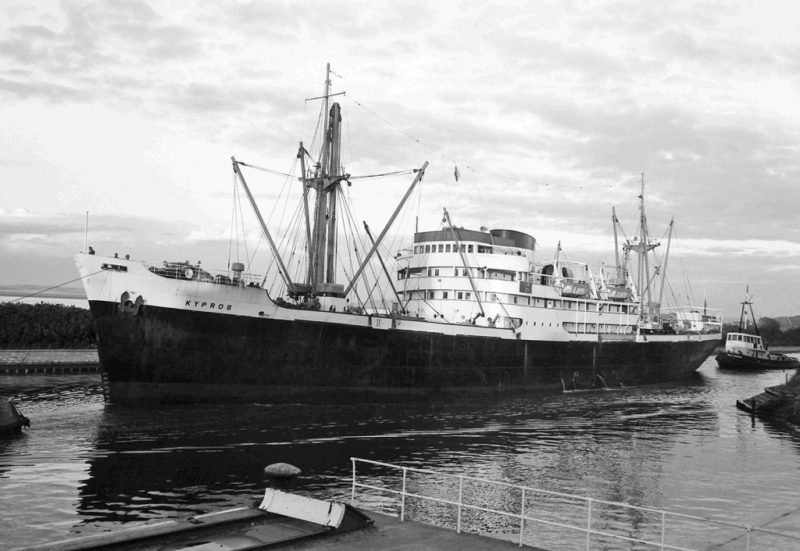
POST-WORLD WAR II YEARS
The post-war years saw Moss Hutchison Line rebuild its fleet of Mediterranean traders with seven new four hold ships delivered from British yards between 1947 and 1952 in Memphis, Kantara, Karnak, Amarna, Assiout, Kypros and Tabor of between 3,200 grt and 3,600 grt and up to 5,000 dwt. The septet were all motorships with refrigerated cargo capacity for oranges, lemons and other citrus fruit, four from the yards of Harland & Wolff Ltd., two from William Pickersgill Ltd. at Sunderland, and one from the Caledon yard at Dundee. The vessels delivered from 1949 onwards initially had white hulls, changing to black hulls a few years later.
The much smaller General Steam Navigation Co. Ltd. coasters Hirondelle and Swift were transferred to the company in 1948/49 to become Landes and Lormont respectively, and the last Mediterranean trader Heron from General Steam Navigation Co. Ltd. was transferred in 1956 to become Kufra, and was sold in 1959. The routes served were:-
Liverpool, Glasgow, Avonmouth and South Wales ports to Casablanca, Algiers, Oran, Malta, Piraeus, Salonika, Limassol, Famagusta, Haifa, Jaffa, Beirut, Tripoli (Syria), Syra, Smyrna, Black Sea ports, and Alexandria for cotton.
Liverpool, Glasgow, Belfast, Dublin, Bristol and Swansea to Rouen, Nantes, Bordeaux and French Bay ports.
Liverpool, Glasgow and Dublin to Oporto, Lisbon and Cadiz.
The loading berths in Liverpool were Harrington Dock or Alexandria Dock, No. 1 Branch North, and in Glasgow at Queens Dock, with the Head Office in Water Street in Liverpool. Tabor was taken on charter by Booker Line in the summer of 1958 while their Amakura and Arakaka were dry docked, and Karnak was also chartered by Booker Line during other dry dockings. Amarna and Kypros were taken on one year charters by Cunard Line in 1967 for Great Lakes trading, being renamed Assyria and Aurania for the charters, while Assiout was taken on charter by T. & J. Harrison of Liverpool in the mid 1960s without change of name. The Mediterr-anean trades lasted throughout the 1960s until Memphis, Kantara and Karnak were sold in 1971/72 and the remaining quartet by 1976.
Two new Mediterranean traders of 4,092 dwt were ordered from the Aberdeen yard of Hall, Russell & Co. Ltd., with Melita launched in June 1971 and completed in November of that year, and Makaria launched by Mrs. Hawkes, wife of a director of the company in February 1972 amid much publicity from P. & O. They were engines aft ships with three holds served by cargo gear that included a 30 ton Stulcken heavy lift derrick for handling containers, 4 smaller derricks and 2 cranes each of 5 tons capacity. Some of their last voyages for Moss Hutchison Line were to the usual Mediterran-ean ports, until they were laid up at Liverpool in May 1978, and they were sold off to Mexican owners in 1979. The pair only traded for the Mexicans for another eight years to give very short careers of fifteen years before being broken up in Mexico in 1987.
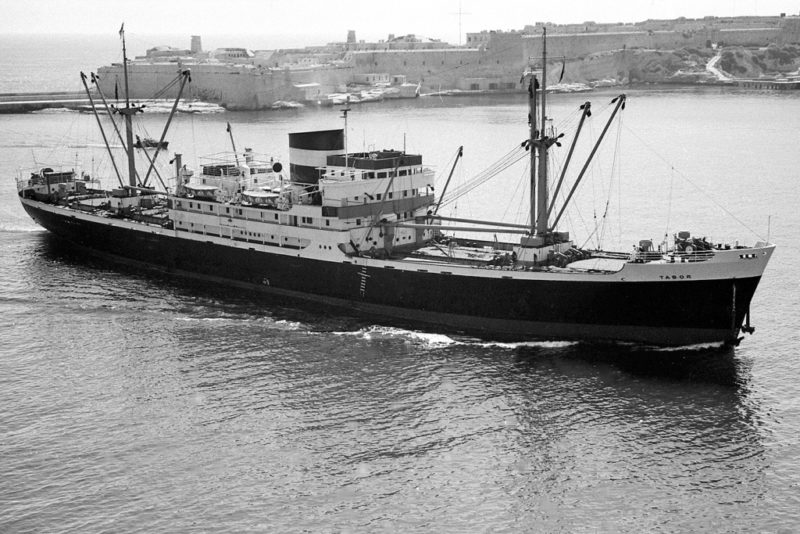
POSTSCRIPT
Competition for cargoes to and from the Mediterranean was severe with Ellerman and Papayanni Lines, MacAndrews, Prince Line, Cunard Line, Fred. Olsen of Norway, Lauritzen of Denmark, and in earlier days the Asia Minor Steam Ship Co. Ltd., founded by the Bell Brothers in 1902 and with whom James Moss and Company had much correspondence. A number of passengers were also carried on Moss Steamship Co. Ltd. steamers to the Mediterranean in earlier days.
The most significant homeward cargoes from the Mediterranean were oranges and citrus fruit from Haifa and Jaffa, and long staple cotton, cotton seed, and cotton goods from Alexandria, which at one time comprised 40% of Egyptian exports. There was even a supertanker named Busiris of 37,558 dwt in post-war years completed by the J. L. Thompson yard at Sunderland in March 1961 on a 15 year charter to Shell, and in the ownership of Moss Hutchison Line but managed by Trident Tankers Ltd. from April 1963. The very long history of James Moss & Company, J. & P. Hutchison, and Moss Hutchison Line lasted for 163 years of trading from 1815 to 1978.
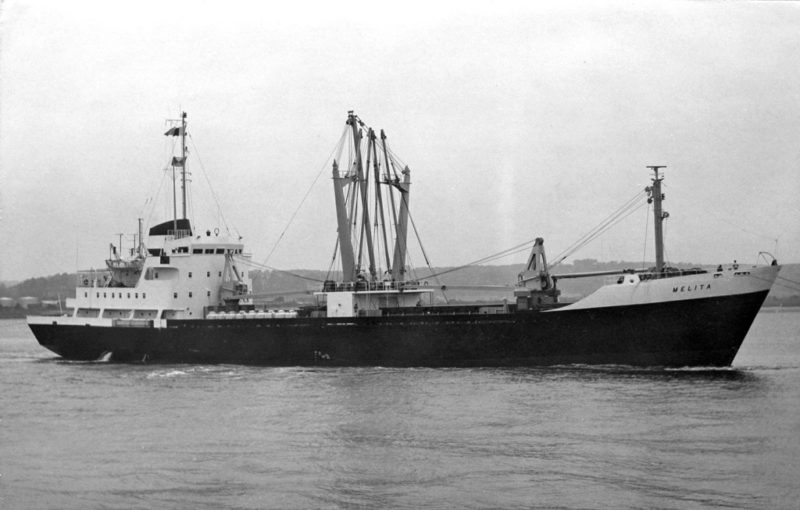





Comments
Sorry, comments are closed for this item